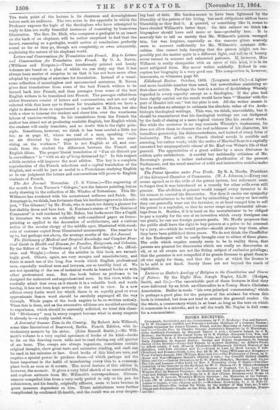troductory memoir by his sister. (John Russell Smith.)—Mr. Will- mott's
volume is a very capital specimen of books of its kind—books to lie on the drawing-room table and be read during any odd quarter
of an, hour. Tho essays are always ingenious, sometimes contain
original thought, show groat taste and extensive reading, and each can be read in ten minutes or less. Good books of this kind are rare, and require a special power to produce them—of which perhaps not the least important is the habit of transferring every idea to a common- place book as soon as it occurs. The novel feature of this edition is, however, the memoir. It gives a very brief sketch of an uneventful life, and copious extracts from Mr. Willmott's correspondence. Circum- stances compelled him from a very early period to rely on his pen for subsistence, and his family, originally affluent, seem to have become in great measure dependent on him. These misfortunes were further complicated by confirmed ill-health, and the result was an ever deepen- The main point of the lecture is its clearness and downrightness ing load of debt. His burden seems to have been lightened by the before such an audience. The two notes in the appendix in which the liberality of the patron of his living, but such obligations seldom leave Professor exposes the logic of the theologians who have attempted to friendship as they find it. A quarrel, or something like it, seems to reply to him are really beautiful instances of reasoning by humorous have clouded Willmott's latter days. On this subject we think his illustration. The Rev. Dr. Dick, who compares a geologist to an insect biographer should have said more or less—probably less. It is.
on the back of an elephant, will be rather surprised to findthat the scarcely fair to tell us merely that Mr. Willmott's patron wronged insect, reasoning as a geologist, would arrive at conclusions perfectly him, but was forgive; especially as the reasons given scarcely sound so far as they go, though not completely, or even adequately, seem to account sufficiently for Mr. Willmott's constant diffi- explaining the nature of his elephant world. culties. One cannot help fancying that the patron might not im-






























 Previous page
Previous page